|
|
|
Sort Order |
|
|
|
Items / Page
|
|
|
|
|
|
|
| Srl | Item |
| 1 |
ID:
073474
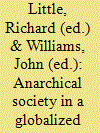

|
|
|
|
|
| Publication |
Hampshire, Plagrave macmillan, 2006.
|
| Description |
ix, 234p.
|
| Standard Number |
140398963X
|
|
|
|
|
|
|
|
|
|
|
|
Copies: C:1/I:0,R:0,Q:0
Circulation
| Accession# | Call# | Current Location | Status | Policy | Location |
| 051573 | 327.1/LIT 051573 | Main | On Shelf | General | |
|
|
|
|
| 2 |
ID:
077000
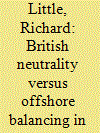

|
|
|
|
|
| Publication |
2007.
|
| Summary/Abstract |
The American Civil War is an important test case for offensive realism because it was the last occasion when offshore balancing by Britain could have prevented the United States from becoming a regional hegemon. Instead, Britain drew on the norm of nonintervention to justify a policy of neutrality. Offensive realists reject the idea that Britain was constrained by normative considerations but disagree about why Britain failed to operate as an offshore balancer. I acknowledge the importance of the offensive realists' regionalized approach to the international system, but use English School thinking to argue that the normative framework that Britain and the United States subscribed to must be taken into account to provide a coherent explanation of Britain's response to the Civil War. Detailed archival research demonstrates that despite concern about u.s. regional hegemony, Britain was unequivocally constrained by normative considerations. The case study suggests, therefore, that societal constraints were stronger than systemic ones
|
|
|
|
|
|
|
|
|
|
|
|
|
|
|
|
| 3 |
ID:
051293


|
|
|
|
|
| Publication |
Oxford, Oxford University Press, 2000.
|
| Description |
xvi, 452p.
|
| Standard Number |
0198780656
|
|
|
|
|
|
|
|
|
|
|
|
Copies: C:1/I:0,R:0,Q:0
Circulation
| Accession# | Call# | Current Location | Status | Policy | Location |
| 048122 | 327.101/BUZ 048122 | Main | On Shelf | General | |
|
|
|
|
| 4 |
ID:
124133
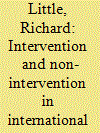

|
|
|
|
|
| Publication |
2013.
|
| Summary/Abstract |
This article aims to show that from the end of the eighteenth century, international order began to be defined in terms of ground rules relating to non-intervention and intervention, with the former being prioritised over the latter. After the Napoleonic wars, within continental Europe there was an attempt to consolidate an intervention ground rule in favour of dynastic legitimacy over the right of self-determination. By contrast, the British and Americans sought to ensure that this ground rule was not extended to the Americas where the ground rule of non-intervention was prioritised. During the nineteenth century, it was the Anglo-American position which came to prevail. Over the same period international order was increasingly bifurcated with the non-intervention ground rule prevailing in the metropolitan core and with the intervention ground rules prevailing in the periphery. This article, however, only focuses on the metropolitan core and draws on two case studies to examine the non-intervention ground rule in very different circumstances. The first examines the British response to the American Civil War in the 1860s during an era of stability in the international order. The second explores the British Response to the Spanish Civil War in the 1930s when the international order was very unstable and giving way to a very different international order.
|
|
|
|
|
|
|
|
|
|
|
|
|
|
|
|
| 5 |
ID:
065269
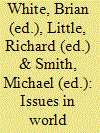

|
|
|
|
|
| Edition |
3rd ed.
|
| Publication |
Hampshire, Palgrave Macmillan, 2005.
|
| Description |
xvii, 326p.
|
| Standard Number |
9781403946119
|
|
|
|
|
|
|
|
|
|
|
|
Copies: C:1/I:0,R:0,Q:0
Circulation
| Accession# | Call# | Current Location | Status | Policy | Location |
| 050041 | 909.83/WHI 050041 | Main | On Shelf | General | |
|
|
|
|
| 6 |
ID:
127382
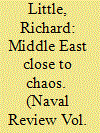

|
|
|
| 7 |
ID:
037289


|
|
|
|
|
| Publication |
London, Croom Helm, 1981.
|
| Description |
431p.
|
| Standard Number |
0709923023
|
|
|
|
|
|
|
|
|
|
|
|
Copies: C:1/I:0,R:0,Q:0
Circulation
| Accession# | Call# | Current Location | Status | Policy | Location |
| 019331 | 327/SMI 019331 | Main | On Shelf | General | |
|
|
|
|
| 8 |
ID:
077412
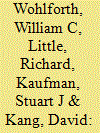

|
|
|
|
|
| Publication |
2007.
|
| Summary/Abstract |
The balance of power is one of the most influential theoretical ideas in international relations, but it has not yet been tested systematically in international systems other than modern Europe and its global successor. This article is the product of a collective and multidisciplinary research effort to redress this deficiency. We report findings from eight new case studies on balancing and balancing failure in different international systems that comprise over 2000 years of international politics. Our findings are inconsistent with any theory that predicts a tendency of international systems toward balance. The factors that best account for variation between balance and hegemony within and across international systems lie outside all recent renditions of balance-of-power theory and indeed, international relations scholarship more generally. Our findings suggest a potentially productive way to reframe research on both the European and contemporary international systems.
|
|
|
|
|
|
|
|
|
|
|
|
|
|
|
|
| 9 |
ID:
092040
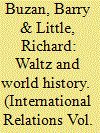

|
|
|
|
|
| Publication |
2009.
|
| Summary/Abstract |
This article provides a critique of Waltz's work from the perspective of world history. It shows how Waltz's commitment to a highly parsimonious theoretical approach paradoxically both sets up the possibility of his theory being universally applicable, and undermines its prospects as a viable approach to understanding world history. Using the key concepts from Waltz's work - units, systems, structure, process - we show the detailed grounds on which his theory fails to apply to such large swathes of time and place, so that its claims to universality fall, even though it can usefully be applied to some times and places. We also show its shortcomings in relation to the essential historical task of periodization. We argue that international relations needs to engage more with world history, and that the task of doing so will fall to approaches other than Waltz's.
|
|
|
|
|
|
|
|
|
|
|
|
|
|
|
|
|
|
|
|
|